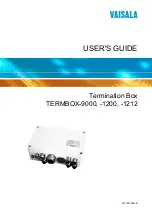
Chapter 18: Security
246
Port Access Control
This section contains information and configuration procedures for the
Port-based Access Control. This section includes the following sections:
“Overview” on page 246
“Port Access Control Configuration” on page 247
Note
After configuring the Port-based Network Access Control, you can
choose to use either the local authentication server in the AT-S109
Version 1.1.0 for 802.1x authentication or a remote RADIUS server
for 802.1x authentication. See “Dial-in User - Local Authentication”
on page 254 or “RADIUS Client” on page 251.
Overview
Port-based Network Access Control (IEEE 802.1x) is used to control who
can send traffic through and receive traffic from a switch port. With this
feature, the switch does not allow an end node to send or receive traffic
through a port until the user of the node logs on by entering a user name
and password.
This feature can prevent an unauthorized individual from connecting a
computer to a port or using an unattended workstation to access your
network resources. Only those users to whom you have assigned a user
name and password are able to use the switch to access the network.
This feature can be used with one of two authentication methods:
The RADIUS authentication protocol requires that a remote
RADIUS server is present on your network. The RADIUS server
performs the authentication of the user name and password
combinations. See “Port Access Control Configuration” on
page 247 and “RADIUS Client” on page 251 for more information.
The Dial-in User (local) authentication method allows you to set up
the authentication parameters internally in the switch without an
external server. In this case, the user name and password
combinations are entered in the associated with an optional VLAN
when they are defined. Based on these entries, the authentication
process is done locally by the AT-S109 Version 1.1.0 using a
standard EAPOL transaction.
Note
RADIUS with Extensible Authentication Protocol (EAP) extensions
is the only supported authentication server for this feature.
Summary of Contents for AT-GS950/24
Page 12: ...Figures 12 ...
Page 14: ...List of Tables 14 ...
Page 18: ...Preface 18 ...
Page 60: ...Chapter 2 Basic Switch Configuration 60 ...
Page 68: ...Chapter 3 Port Configuration 68 ...
Page 74: ...Chapter 4 Port Mirroring 74 ...
Page 94: ...Chapter 5 Virtual LANs 94 ...
Page 102: ...Chapter 6 GVRP 102 ...
Page 132: ...Chapter 8 STP and RSTP 132 ...
Page 146: ...Chapter 9 Multiple Spanning Tree Protocol 146 ...
Page 156: ...Chapter 10 Static Port Trunking 156 ...
Page 178: ...Chapter 12 Quality of Service CoS 178 ...
Page 206: ...Chapter 13 Access Control Configuration 206 ...
Page 226: ...Chapter 15 MAC Address Table 226 ...
Page 238: ...Chapter 16 DHCP Snooping 238 ...
Page 244: ...Chapter 17 IGMP Snooping 244 ...
Page 288: ...Chapter 21 Simple Network Management Protocol SNMPv3 288 ...
Page 300: ...Chapter 22 RMON 300 ...
Page 322: ...Chapter 24 Management Software Updates 322 ...
Page 348: ...Appendix A MSTP Overview 348 ...
Page 366: ...Appendix A AT GS950 24 Default Parameters 366 ...
















































